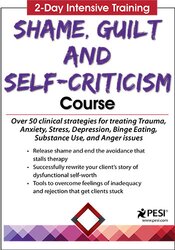

There’s no better feeling than providing relief from suffering. From the chronically stressed, to those grappling with trauma, dysfunctional relationships with food, substance use issues or anger -- you love the fulfillment of making a difference.
But shame, guilt, and self-criticism play a critical role in these problems and can dramatically disrupt therapy. You worry that you’ll fail to convince clients who feel unworthy that they deserve a better life. And you’re left frustrated, drained and unsure what will move therapy forward when fears about failure and inadequacy create a state of paralysis in shame-driven and self-critical clients.
This recording will give you the skills and tools you need to end the tyrannical hold of shame, guilt and self-criticism and empower your clients to develop the acceptance of themselves, others and reality necessary for the effective treatment of trauma, stress, anxiety, depression, binge eating, substance use, and anger issues.
Experience the satisfaction of greater therapeutic success when you can help clients release unhealthy shame and cultivate the self-acceptance they need to move toward a brighter future!
This online program is worth 12.5 hours CPD.
| File type | File name | Number of pages | |
|---|---|---|---|
| Manual - 2-Day Intensive Training: Shame, Guilt and Self-Criticism Course (3.4 MB) | 64 Pages | Available after Purchase |

Pavel Somov, PhD, is a licensed psychologist in private practice with over 20 years of clinical experience working with anger management, shame, guilt, self-criticism, eating issues, and perfectionism. He has worked in a variety of clinical settings including running a drug and alcohol treatment program in a county jail.
Dr. Somov is on the advisory board for The Mindfulness Project (London, UK) and has conducted a variety of trainings for mental health professionals both domestically and internationally on applying mindfulness-based interventions to a variety of psychological issues.
His work has been discussed in a number of radio interviews and in print publications including Martha Stewart’s Body + Soul Magazine and Oprah Winfrey’s O Magazine. Dr. Somov is the author of Anger Management Jumpstart: A 4-Session Mindfulness Path to Compassion and Change (PESI Publishing, 2013) as well as a number of self-help books on perfectionism, overeating, and addiction.
Speaker Disclosures:
Financial: Pavel Somov maintains a private practice and has an employment relationship with Vista Behavioral health Associates. He receives royalties as a published author. Pavel Somov receives a speaking honorarium, recording, and book royalties from PESI, Inc. He has no relevant financial relationships with ineligible organizations.
Non-financial: Pavel Somov is a member of the Pennsylvania Psychological Association and the Greater Pittsburgh Psychological Association. He serves on the advisory board for the Mindfulness Project.
Shame, Guilt and Motivational Apathy as Impediments to Clinical Progress
Tools for Catalyzing Progress in Therapy
Shame: Clinical Techniques to Move Therapy Forward
Guilt: Help Clients Overcome the Debts of Guilt
Self-Doubt, Dilemmas & Indecision: Interventions for Clients Paralyzed by Uncertainty
Motivational Apathy & Self-Inefficacy: Strategies to Improve Motivation and Autonomy
Self-Criticism and Self-Stigmatization: Quiet Your Client’s Inner Critic
Working through Affect Avoidance
Connect Specific Strategies to the Treatment of:
Trauma
Stress and Anxiety
Emotional Eating & Binge Eating
Anger
Depression
Substance Abuse
Betrayal, Secrecy & Deception
Research, Limitations and Potential Risks
| 5 |
|
| 4 |
|
| 3 |
|
| 2 |
|
| 1 |
|
Satisfaction Guarantee
Your satisfaction is our goal and our guarantee. Concerns should be addressed to info@pesi.co.uk or call 01235847393.
Please wait ...